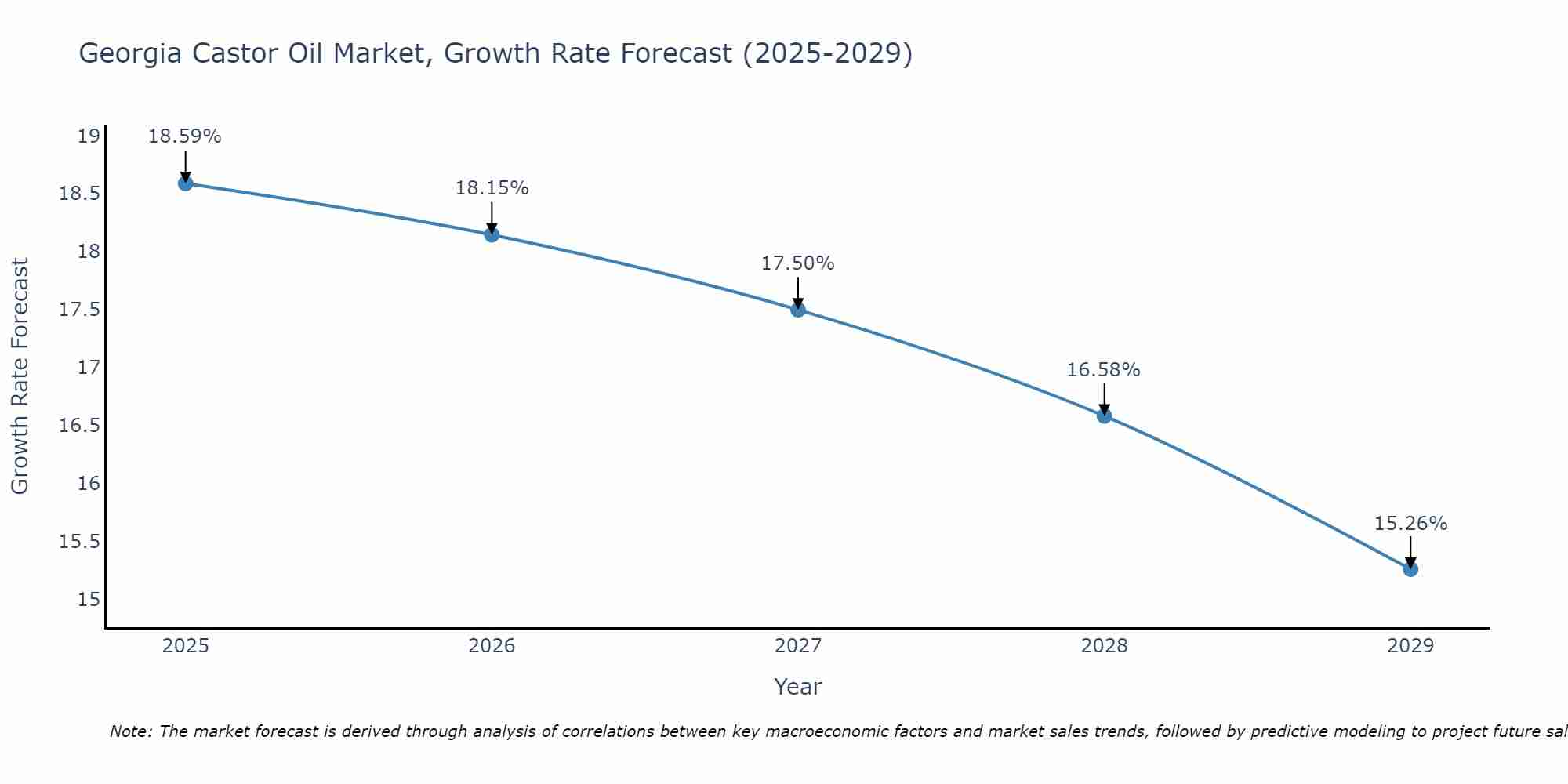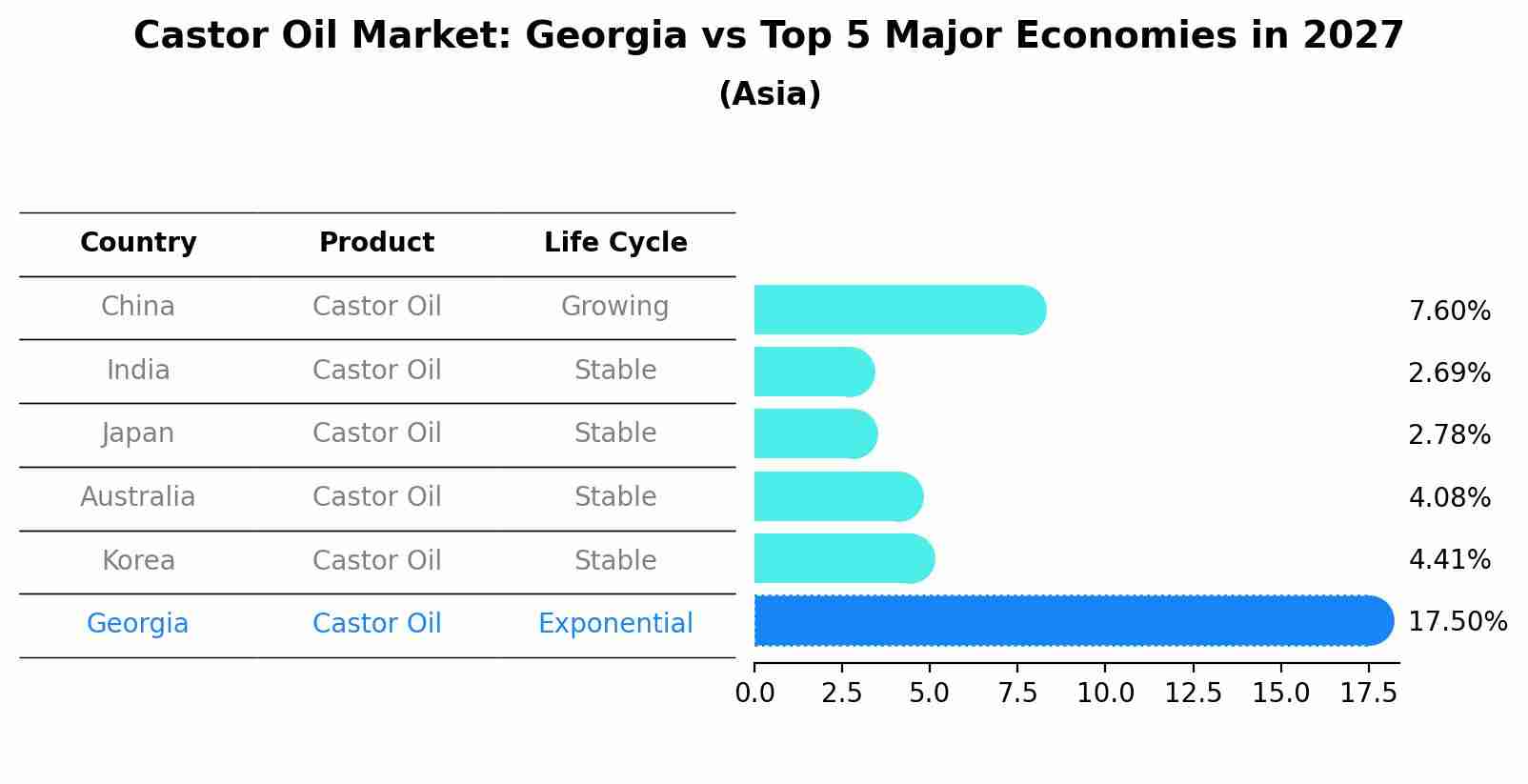Georgia Castor Oil Market (2025-2031) Outlook | Share, Forecast, Size, Analysis, Trends, Revenue, Value, Growth, Industry & Companies
| Product Code: ETC410096 | Publication Date: Oct 2022 | Updated Date: Apr 2025 | Product Type: Market Research Report | |
| Publisher: 6Wresearch | Author: Ravi Bhandari | No. of Pages: 75 | No. of Figures: 35 | No. of Tables: 20 |
Georgia Castor Oil Market Size Growth Rate
The Georgia Castor Oil Market could see a tapering of growth rates over 2025 to 2029. Although the growth rate starts strong at 18.59% in 2025, it steadily loses momentum, ending at 15.26% by 2029.

Castor Oil Market: Georgia vs Top 5 Major Economies in 2027 (Asia)
By 2027, the Castor Oil market in Georgia is anticipated to reach a growth rate of 17.50%, as part of an increasingly competitive Asia region, where China remains at the forefront, supported by India, Japan, Australia and South Korea, driving innovations and market adoption across sectors.

Georgia Castor Oil Market Overview
The castor oil market in Georgia is witnessing robust growth owing to the increasing awareness about the health and industrial benefits of this natural oil. Castor oil is widely used in pharmaceuticals, cosmetics, lubricants, and bio-based polymers due to its unique chemical composition and versatile properties. With growing concerns about environmental sustainability, there is a rising demand for eco-friendly alternatives to petroleum-based products, driving the adoption of castor oil derivatives in various industrial applications.
Drivers of the market
The castor oil market in Georgia is driven by its wide-ranging industrial applications, particularly in the cosmetics, pharmaceuticals, and lubricants industries. Castor oil is valued for its moisturizing and anti-inflammatory properties in cosmetic products, while its medicinal properties contribute to its use in pharmaceutical formulations. Additionally, the expanding industrial sector in Georgia is boosting the demand for castor oil as a lubricant and biofuel feedstock.
Challenges of the market
Fluctuations in castor bean production due to factors like weather conditions and pests could pose challenges in the castor oil market. Ensuring a stable supply chain and exploring sustainable cultivation practices could be crucial for market stability.
Government Policy of the market
Government policies in the castor oil market may encompass regulations on agricultural practices, quality standards for oil production, and trade policies affecting castor oil exports and imports. Additionally, there might be initiatives to promote sustainable farming practices and research on alternative uses for castor oil.
Key Highlights of the Report:
- Georgia Castor Oil Market Outlook
- Market Size of Georgia Castor Oil Market, 2024
- Forecast of Georgia Castor Oil Market, 2031
- Historical Data and Forecast of Georgia Castor Oil Revenues & Volume for the Period 2021-2031
- Georgia Castor Oil Market Trend Evolution
- Georgia Castor Oil Market Drivers and Challenges
- Georgia Castor Oil Price Trends
- Georgia Castor Oil Porter's Five Forces
- Georgia Castor Oil Industry Life Cycle
- Historical Data and Forecast of Georgia Castor Oil Market Revenues & Volume By End Use for the Period 2021-2031
- Historical Data and Forecast of Georgia Castor Oil Market Revenues & Volume By Pharmaceuticals for the Period 2021-2031
- Historical Data and Forecast of Georgia Castor Oil Market Revenues & Volume By Lubricants for the Period 2021-2031
- Historical Data and Forecast of Georgia Castor Oil Market Revenues & Volume By Paints for the Period 2021-2031
- Historical Data and Forecast of Georgia Castor Oil Market Revenues & Volume By Soaps for the Period 2021-2031
- Historical Data and Forecast of Georgia Castor Oil Market Revenues & Volume By Others for the Period 2021-2031
- Georgia Castor Oil Import Export Trade Statistics
- Market Opportunity Assessment By End Use
- Georgia Castor Oil Top Companies Market Share
- Georgia Castor Oil Competitive Benchmarking By Technical and Operational Parameters
- Georgia Castor Oil Company Profiles
- Georgia Castor Oil Key Strategic Recommendations
Frequently Asked Questions About the Market Study (FAQs):
- Single User License$ 1,995
- Department License$ 2,400
- Site License$ 3,120
- Global License$ 3,795
Search
Thought Leadership and Analyst Meet
Our Clients
Related Reports
- Canada Oil and Gas Market (2026-2032) | Share, Segmentation, Value, Industry, Trends, Forecast, Analysis, Size & Revenue, Growth, Competitive Landscape, Outlook, Companies
- Germany Breakfast Food Market (2026-2032) | Industry, Share, Growth, Size, Companies, Value, Analysis, Revenue, Trends, Forecast & Outlook
- Australia Briquette Market (2025-2031) | Growth, Size, Revenue, Forecast, Analysis, Trends, Value, Share, Industry & Companies
- Vietnam System Integrator Market (2025-2031) | Size, Companies, Analysis, Industry, Value, Forecast, Growth, Trends, Revenue & Share
- ASEAN and Thailand Brain Health Supplements Market (2025-2031) | Strategy, Consumer Insights, Analysis, Investment Trends, Opportunities, Growth, Size, Share, Industry, Revenue, Segments, Value, Segmentation, Supply, Forecast, Restraints, Outlook, Competition, Drivers, Trends, Demand, Pricing Analysis, Competitive, Strategic Insights, Companies, Challenges
- ASEAN Bearings Market (2025-2031) | Strategy, Consumer Insights, Analysis, Investment Trends, Opportunities, Growth, Size, Share, Industry, Revenue, Segments, Value, Segmentation, Supply, Forecast, Restraints, Outlook, Competition, Drivers, Trends, Demand, Pricing Analysis, Competitive, Strategic Insights, Companies, Challenges
- Europe Flooring Market (2025-2031) | Outlook, Share, Industry, Trends, Forecast, Companies, Revenue, Size, Analysis, Growth & Value
- Saudi Arabia Manlift Market (2025-2031) | Outlook, Size, Growth, Trends, Companies, Industry, Revenue, Value, Share, Forecast & Analysis
- Uganda Excavator, Crane, and Wheel Loaders Market (2025-2031) | Strategy, Consumer Insights, Analysis, Investment Trends, Opportunities, Growth, Size, Share, Industry, Revenue, Segments, Value, Segmentation, Supply, Forecast, Restraints, Outlook, Competition, Drivers, Trends, Demand, Pricing Analysis, Competitive, Strategic Insights, Companies, Challenges
- Rwanda Excavator, Crane, and Wheel Loaders Market (2025-2031) | Strategy, Consumer Insights, Analysis, Investment Trends, Opportunities, Growth, Size, Share, Industry, Revenue, Segments, Value, Segmentation, Supply, Forecast, Restraints, Outlook, Competition, Drivers, Trends, Demand, Pricing Analysis, Competitive, Strategic Insights, Companies, Challenges
Industry Events and Analyst Meet
Whitepaper
- Middle East & Africa Commercial Security Market Click here to view more.
- Middle East & Africa Fire Safety Systems & Equipment Market Click here to view more.
- GCC Drone Market Click here to view more.
- Middle East Lighting Fixture Market Click here to view more.
- GCC Physical & Perimeter Security Market Click here to view more.
6WResearch In News
- Doha a strategic location for EV manufacturing hub: IPA Qatar
- Demand for luxury TVs surging in the GCC, says Samsung
- Empowering Growth: The Thriving Journey of Bangladesh’s Cable Industry
- Demand for luxury TVs surging in the GCC, says Samsung
- Video call with a traditional healer? Once unthinkable, it’s now common in South Africa
- Intelligent Buildings To Smooth GCC’s Path To Net Zero


















